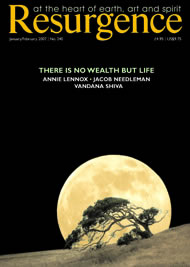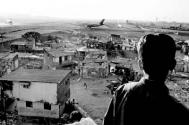MONEY HAS BECOME a measure of how wealthy and how poor people are. It has become the measure of human wellbeing. To live on less than a dollar a day is the
definition of poverty. To increase incomes to more than a dollar a day is interpreted as an end to poverty. This equating of money with wealth and wealth with wellbeing is misplaced on multiple counts. Money does not reflect nature’s wealth or people’s wealth, and it definitely fails to
measure the wellbeing of society.
Both ecology and economics have emerged from the same root: oikos, the Greek word for ‘household’. As long as economics was focused on the household, it recognised and respected its basis in natural resources, the limits of ecological renewal. It was focused on providing for basic human needs within these limits. Economics based on the household was women-centred.
In today’s world, economics is separated from, and opposed to, both ecological processes and basic needs. While the destruction of nature has been justified on grounds of improving human welfare, for the majority of people poverty and dispossession have increased. While being non-sustainable it is also economically unjust. While being promoted as ‘economic development’, it is leading to under-development; while projecting growth, it is causing life-threatening destruction.
The resource demands of the current model of the economy are leading to oil wars, water wars and food wars. There are three levels of violence involved in non-sustainable development: violence against the Earth, which is expressed as the ecological crisis; violence against people, which is expressed as poverty, destitution and displacement; and violence of war and conflict, expressed as the powerful reach for resources that lie in other communities and countries.
There are also three levels of economy: nature’s economy, people’s sustenance economy, and the market economy. Nature’s economy is the foundation of all economies because it supports all life on Earth. In nature’s economy the currency is life and processes that maintain life. Money cannot measure nature’s health and wellbeing. Money and life have a one-way relationship. Nature can be exploited, mined and raped for commerce to generate money. However, money cannot regenerate nature. The money economy and the global financial system are parasitic. They predate on the economies that support them – the economy of nature and the economy of people.
The people’s sustenance economy is not measurable by money either. People can have more money but still experience poverty because food, clothing, shelter, health, energy, education are all more costly as a result of privatisation. More money can go hand in hand with increased material poverty, with people having less access to basic needs such as food and water. The fact that in spite of economies growing, billions of people are without access to these basic essentials indicates that money does not measure wellbeing. India now has 8% economic growth, yet it is home to a third of the world’s malnourished children. In fact when economies are measured only in terms of money flow, inequalities grow: the rich get richer, the poor get poorer. And the rich might be rich in monetary terms, but they too are poor in the wider context of what being human means.
People can have immeasurable financial wealth and be socially impoverished – without love and companionship, without solidarity and community, with an empty soul in spite of overflowing bank accounts.
MONEY GROWTH IS usually measured in terms of Gross National Product (GNP). However, GNP fails to measure the decay of nature’s economy and the social economy. In the definition of measuring growth is the destruction of the self-sufficient,
self-provisioning people’s sustenance economy. “If you produce what you consume, you do not produce” – that is the assumption underlying economic growth. That is how rich ecosystems and rich cultures are destroyed. Resources and labour must leave an ecosystem or household to contribute to ‘growth’ (measured in terms of money). Ecological growth is not counted; in fact ecological destruction contributes to increase in GNP. Social growth of individuals and societies is not counted; in fact social decay and disintegration contribute to GNP.
I have witnessed again and again that as people’s resources are commoditised and people’s economies are commercialised, money flow does increase in society, but it is mainly outflow from nature and people to commercial interests and corporations. The money economy grows, but nature’s economy and people’s economy shrink.
Take the case of agriculture. Production of food is primary
production. All it needs is soil, water, biodiversity and the creative energy of farmers. Ecological organic farming and traditional agriculture generate a positive economy, a living economy, which conserves soil, water and bio-diversity, generates livelihoods and produces good, healthy, abundant, diverse food. There is no hunger and no unemployment. If droughts or floods affect production, hunger is localised in space and time. It is not permanent. Even today there are
agricultural systems which have no monetary inputs yet they produce more food, more health, more prosperity for local communities than industrial systems do.
Money has transformed agriculture from a positive economy to a negative economy, which is killing biodiversity, the soil and our farmers. We in India have witnessed a new tragedy of an epidemic of farmers’ suicides (more than 100,000 in ten years) as more costly inputs such as non-renewable genetically modified and hybrid seeds, pesticides and fertilisers are sold to farmers on credit. The farmers become steeped in unpayable debt and end up consuming the pesticides that got them into debt, to end their lives. In this negative ‘suicide economy’, money flows do increase but life is extinguished and wellbeing diminished. The government response is to offer more credit, which deepens the debt crisis. The real solution to the epidemic of farmers’ suicides is the practice and promotion of sustainable organic production, which gets rid of purchased external inputs, which need money, and allowing the value of agricultural produce to reflect the costs of production and the costs of living of farming families. In the globalised economy, the price of food does not reflect its real costs. It is distracted by US$4 billion of subsidies by rich countries, and by monopoly markets controlled by five agribusiness giants. Money has stopped being a measure of value in food systems.
A debt-free, suicide-free, sustainable agriculture is not only possible: it is necessary to ensure nature’s wellbeing, the wellbeing of farmers, and the wellbeing of consumers.
MONEY HAS BECOME a mis-measure of wealth and wellbeing for two reasons. First, money does not reflect the ecological and social destruction that is an externality of ‘growth’ as measured in terms of money and financial resources. Secondly, money no longer reflects the resources, goods and services it commands. Money has taken on a life of its own: it can reproduce itself and multiply, totally separated from the real wealth in nature and society. More than US$3 trillion move around the world daily in a global financial casino, and this is fifty times more than the real resources in the world.
Money has become totally dissociated from real value, but those who accumulate financial resources can then stake claim on the real resources of people – their land and water, their forests and seeds. ‘Hungry’ money is predating on the last drop of water and the last square inch of land on the planet. This is not an end to poverty. It is an end to human rights and justice. People are being made disposable in a world where money rules.
Rarely is the increased cost of living and cost of production or the displacement of people from their land and livelihoods taken into account when ‘growth’ is measured in terms of money flow and financial transactions. When ecological internal input farming is replaced by purchased inputs, the environment is destroyed and farmers are dispossessed. However, there is more ‘growth’ when measured in increased purchases of chemicals and costly seeds. When corporations patent seeds, a trillion dollars of increased money will flow as royalty, but the farmers will be poorer. When water is commoditised and water markets of a trillion dollars are created, corporate profits explode and GNP increases, but people are left thirsty and poor.
When every aspect of life is commercialised and commoditised, living becomes more costly, and people are poor even if they earn more than a dollar a day. On the other hand, people can be affluent in material terms even without the money economy if they have access to land, their soils are fertile, their rivers flow clean, their cultures are rich and carry traditions of producing beautiful homes and clothing and delicious food, and there are social cohesion, solidarity and a spirit of community.
Trade and exchange of goods and services have always existed in human societies, but these were subjected to nature’s and people’s economies. The elevation of the domain of the market and money to the position of the highest organising principle and the only measure of our wellbeing has in fact led to the undermining of the processes that maintain and sustain life. The richer we get, the poorer we become ecologically and culturally.
We need to create measures beyond money, economies beyond the global supermarket to rejuvenate real wealth and authentic wellbeing. We need to remember that the real currency of life is life itself.
Vandana Shiva is author of Earth Democracy. She is a campaigner for ecological rights, and teaches regularly at Schumacher College in the UK and The School of Seed in India.
QUOTES
The dominant model of ‘economic development’ has become anti-life.
More than US$3 trillion move around the world daily in a global financial casino, and this is fifty times more than real resources in the world.
We need to remember that the real currency of life is life itself.








